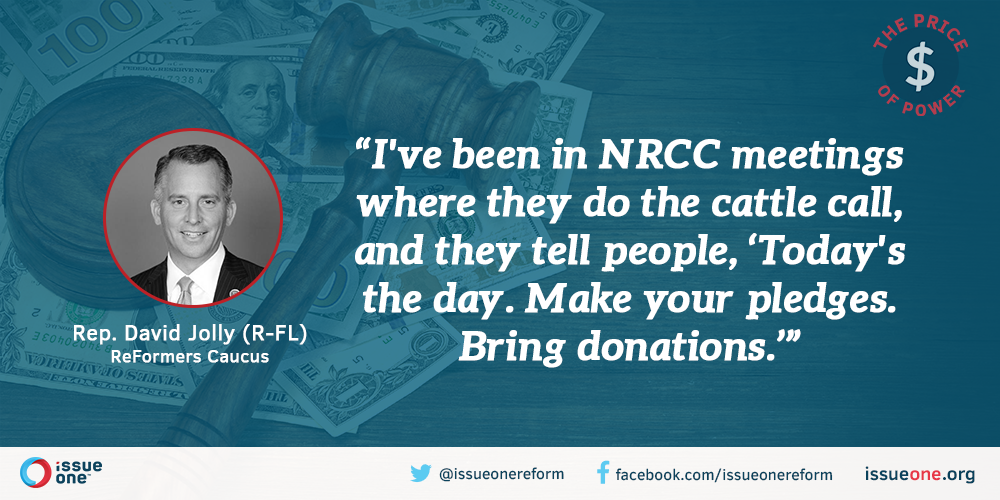Every Tuesday and Thursday over the next few weeks, we will release edited excerpts of those conversations with these former lawmakers to supplement and expand on the disturbing picture the report painted: that of a broken democracy, which Congress itself must act to fix.
***
David Jolly, a member of Issue One’s ReFormers Caucus, is a Republican who represented Florida’s 13th Congressional District in the U.S. House of Representatives from March 2014 until January 2017. During his first term, Jolly served on the House Veteran Affairs Committee and House Transportation and Infrastructure Committee. During his second term, Jolly served on the House Appropriations Committee.
We are working on a report about the role of party dues and fundraising as it relates to different committees, committee assignments and chairmanships. What do you see as the key problems with this dynamic right now?
It’s just an additional strain on top of members’ already crushing burden to raise money for their own reelection efforts.
How did this play out for you?
I represented a district where I probably needed to raise two to three million dollars for my own reelection. Then, on top of that, given that I was on the House Appropriations Committee, I was told I needed to raise $400,000 for the National Republican Congressional Committee [NRCC].
What did you do when you were told that you needed to raise $400,000?
I didn’t do it.
But you had paid your party dues after your were first elected, right?
Yes. I got elected in March of 2014, and my first week I was given a dues statement for $87,000 — it was basically $200,000 for being on T&I [the House Transportation and Infrastructure Committee], but it was prorated. I did my best to pay that.
What was the first question that went through your head when you were told about these party dues during your first week on the job?
Who wants to give to the most junior member of Congress with very little influence outside of his own constituents’ interests? Who out there in the PAC community or in the high finance world across the country that supports Republicans has any interest in supporting the most junior member of Congress? I was number 435 out of 435.
Can you summarize how the party dues system is structured?
If you are on an important committee, you’re expected to have a larger role in fundraising for the party.
And how fundraising would fit into NRCC meetings?
I’ve been in NRCC meetings where they do the cattle call, and they tell people, ‘Today’s the day. Make your pledges. Bring donations.’ A member of Congress stands up and has a million-dollar check to give the NRCC. A second one has a two million-dollar check to give to the NRCC. You really see it going into years where members are fighting to become chairman of a big committee, or when they’re expecting a leadership change.
They have cattle calls?
Yeah, they have the cattle calls, and they ask members to stand up. Some members stand up and say, ‘Look, I have $20,000 that I can give today.’ There’s always a few that stand up with big checks — sometimes seven figures.
I’ve heard there is a board at the NRCC headquarters that details fundraising by members of Congress.
The worst part, the shameful part, is the board. It’s the wall of shame. You go to an NRCC meeting, and they have a list of every single member of the Republican Conference — and how much they’ve given and how much they owe. The board is clearly there to intimidate and remind and pressure. It is probably six feet tall by 15 or 20 feet long. It’s a big board.
Do you think that committee chairs should be required to raise this much cash for the parties?
No.
What ideas have you pushed in terms of a solution?
The idea of my ‘Stop Act’ was we should prohibit members of Congress from directly soliciting money for a party committee or for their own campaign. Now understand what that does. That says to the NRCC, ‘Go raise $50 million if you want to. But don’t put the burden on members of Congress to be calling people, shaking them down for money for the party. That’s why you have a staff.’ Once you’re elected to Congress, your responsibility should be to Congress.
The other thing I think you could do is prohibit transfers between a candidate’s committee and the party committee. If you take a senior member in a safe district, like a Jeb Hensarling, they can raise two million dollars for their candidate committee, but they never have a reelection that matters. So they just turn around, and they’re able to transfer funds to the NRCC. It’s basically a pass through.
How widespread do you think frustrations are about the way that the party dues are structured right now?
Members hate it. They hate it. They absolutely hate it. I think there are fewer than 10 members of Congress who would say they actually enjoy raising money for the party, but they do it because they want to move up in seniority or get on the right committees.
What things should the steering committee be paying attention to when it makes decisions about committee assignments?
They should be considering who’s the most effective person to serve on the committee to do what’s right for the Congress and for the country.
And how do you think it’s playing out right now?
The process to get on the best committees, and stay on those committees, has as much to do with fundraising as it does anything else. I think leadership wants the right people with subject matter experience on the right committees. But while subject matter does matter, it comes with a bill, and it’s real.
Why do the parties frequently put lawmakers in competitive races on important committees?
If you’re in a highly competitive district in an expensive media market, you need the ability to raise more money than some of your colleagues. So they’ll put you on Ways and Means, or Appropriations, or Energy and Commerce, so that the PAC money is more accessible.
What do you mean by that?
For instance, there’s nobody who ever donated to my campaign because they had an interest in the Veterans Affairs committee. Right? But if you’re on Ways and Means or Appropriations or Energy and Commerce, you’re dealing with health care. You’re dealing with transportation. There are a lot more interested groups.
Some people are worried about special interests coming in and trying to buy access to lawmakers. Other people say that the leaders of committees are in a position to extort the people they regulate. What is your take on that dynamic?
Look, I would favor broad-based campaign finance reform, where we revisit limits, transparency and whether or not PACs should be able to give. But I always caution people. Don’t make PACs the boogieman. It’s the member of Congress who’s responsible for holding the public trust and to be held accountable when they violate it. It is the member of Congress, not the donor and not the PAC, who holds the public trust. The person who has been entrusted by their community to make faithful decisions in the best interest of the country are the members of Congress, not a donor or a PAC.
How much time do fundraising demands take away from lawmakers’ congressional duties?
It is the No. 1 time demand in a member’s week. No question. If you add up attending breakfasts, lunches, cocktails, dinners and call time, it is the No 1. time responsibility. You have members of the House who, during the off year, might spend less time doing it — and, certainly, if you are not in a competitive district, maybe you are not spending as much time doing it — but if you are a House member in a competitive race, particularly a more junior one, it is your No. 1 focus every week when you are in Washington. For those who do that, your chief of staff puts call time on your calendar, and it is blocked off.
Former Rep. David Jolly (R-FL) is a member of Issue One’s ReFormers Caucus, the largest bipartisan coalition ever assembled on behalf of political reform and government ethics. Read more about “The Price of Power” here.





